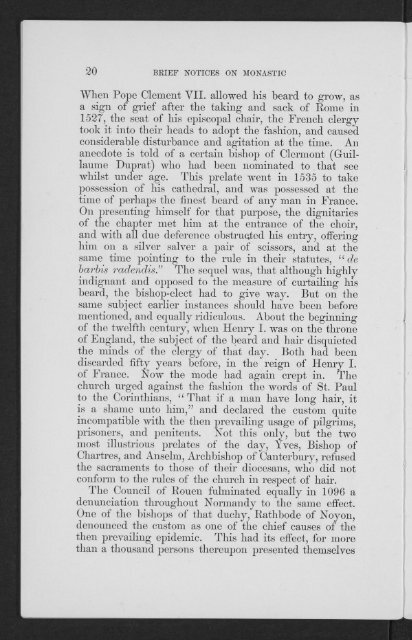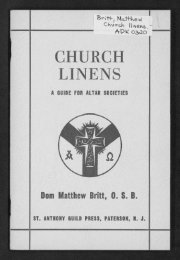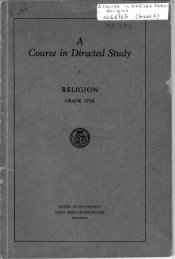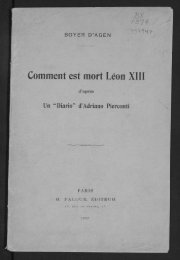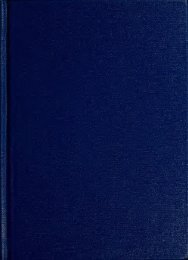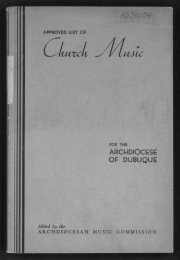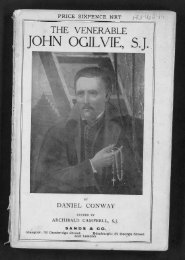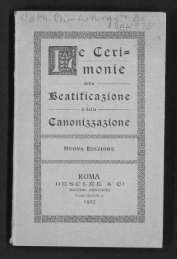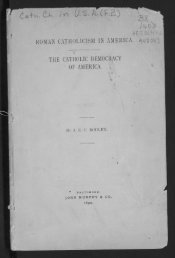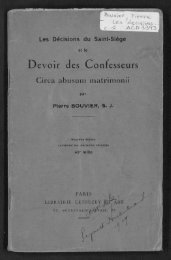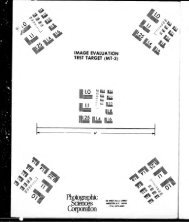MONASTIC AND ECCLESIASTICAL. COSTUME.
MONASTIC AND ECCLESIASTICAL. COSTUME.
MONASTIC AND ECCLESIASTICAL. COSTUME.
Create successful ePaper yourself
Turn your PDF publications into a flip-book with our unique Google optimized e-Paper software.
20 BBIEF NOTICES ON <strong>MONASTIC</strong><br />
When Pope Clement VII. allowed his beard to grow, as<br />
a sign of grief after the taking and sack of Rome in<br />
1527, the seat of his episcopal chair, the French clergy<br />
took it into their heads to adopt the fashion, and caused<br />
considerable disturbance and agitation at the time. An<br />
anecdote is told of a certain bishop of Clermont (Guillaume<br />
Duprat) who had been nominated to . that see<br />
whilst under age. This prelate went in 1535 to take<br />
possession of his cathedral, and was possessed at the<br />
time of perhaps the finest beard of any man in France.<br />
On presenting himself for that purpose, the dignitaries<br />
of the chapter met him at the entrance of the choir,<br />
and with all due deference obstructed his entry, offering<br />
him on a silver salver a pair of scissors, and at the<br />
same time pointing to the rule in their statutes, " de<br />
barbis radendis." The sequel was, that although highly<br />
indignant and opposed to the measure of curtailing his<br />
beard, the bishop-elect had to give way. But on the<br />
same subject earlier instances should have been before<br />
mentioned, and equally ridiculous. About the beginning<br />
of the twelfth century, when Henry I. was on the throne<br />
of England, the subject of the beard and hair disquieted<br />
the minds of the clergy of that day. Both had been<br />
discarded fifty years before, in the reign of Henry I.<br />
of France. Now the mode had again crept in. The<br />
church urged against the fashion the words of St. Paul<br />
to the Corinthians, " That if a man have long hair, it<br />
is a shame unto him," and declared the custom quite<br />
incompatible with the then prevailing usage of pilgrims,<br />
prisoners, and penitents. Not this only, but the two<br />
most illustrious prelates of the day, Yves, Bishop of<br />
Chartres, and Anselm, Archbishop of Canterbury, refused<br />
the sacraments to those of their diocesans, who did not<br />
conform to the rules of the church in respect of hair.<br />
The Council of Rouen fulminated equally in 1096 a<br />
denunciation throughout Normandy to the same effect.<br />
One of the bishops of that duchy, Rathbode of Noyon,<br />
denounced the custom as one of the chief causes of the<br />
then prevailing epidemic. This had its effect, for more<br />
than a thousand persons thereupon presented themselves


